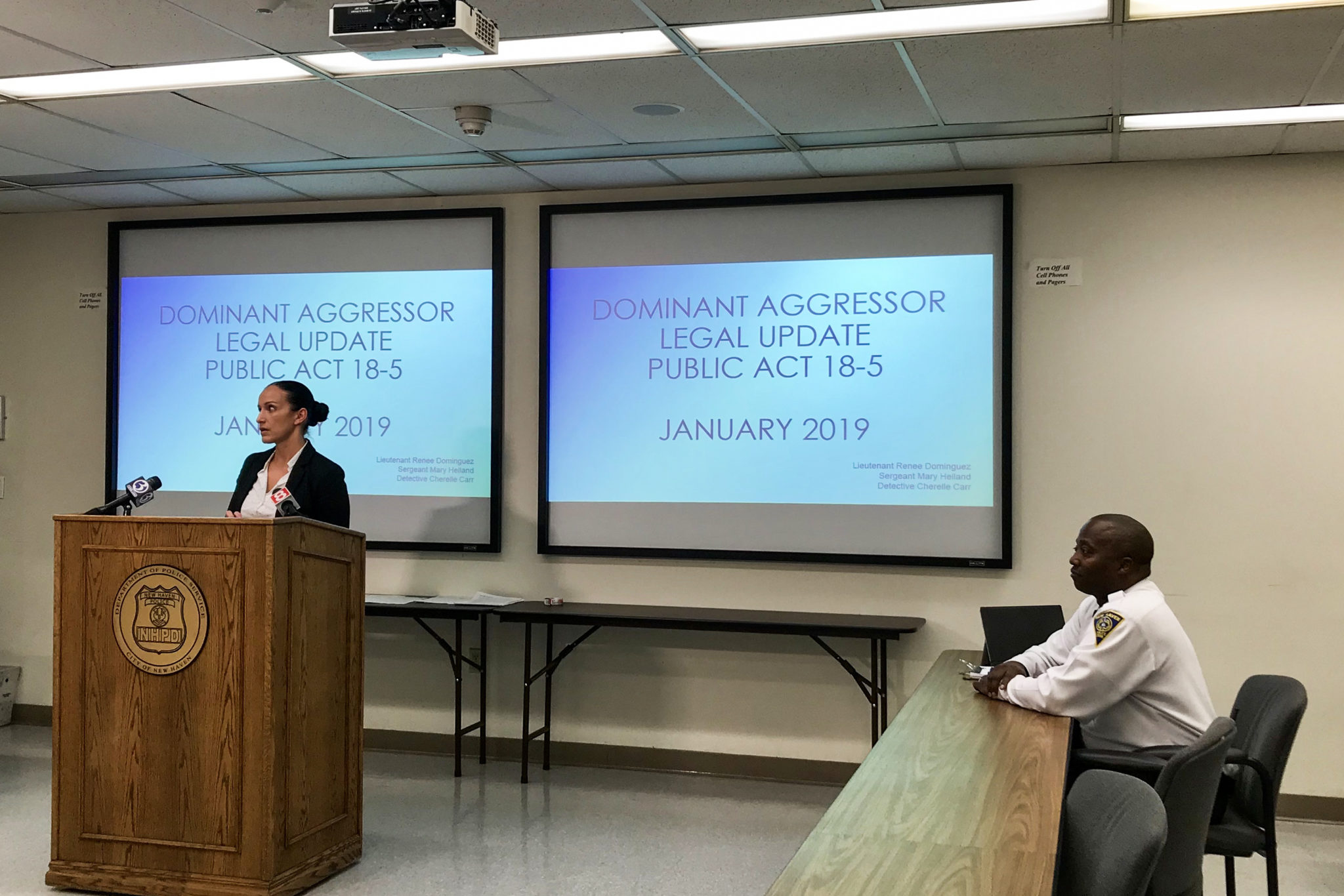
Seventeen New Haven police officers — some in uniform, others in plain clothes — sat in seminar formation on Thursday afternoon, watching a slideshow of information at the New Haven Police Department headquarters. The topic: “Dominant Aggressors in Domestic Violence Cases.”
On Jan. 1, Connecticut joined 27 other states when Public Act No. 18-5 — also known as the “Dominant Aggressor Law” — took effect. The act changed state law to give officers more on-site discretion when making arrests in domestic violence cases. Prior to the new act, victims of domestic violence faced a large risk of getting caught up in“dual arrests” — a situation where a responding officer arrests both the domestic violence victim and its perpetrator. Connecticut had a mandatory arrest law, which meant that officers must make one or more arrests in response to a domestic violence call. This often led to dual arrests. The act represents a notable shift in Connecticut’s family violence law. Now, officers responding to a domestic violence call must make an on-site determination and arrest the “dominant aggressor” — language previously not used in state law.
The issue with these dual arrests is that they often “re-victimize victims,” Lieutenant Renee Dominguez, head of the department’s Family Service Unit said. She said that if the victim of domestic violence had finally called the police, with old procedures in place, the victim may say, “Oh, I am not going to call the police because I finally took a stand against being abused, and now I end up getting arrested.”
A dominant aggressor is defined in Public Act No. 18-5 as the person who “poses the most serious ongoing threat in a situation involving the suspected commission of a family violence crime.” This concept is novel in state law, among the several legal changes introduced in the new measure.
With statewide mandatory training written into the law, the New Haven Police Department has been busy for the past three weeks, retraining every officer. Thursday was the last day of domestic violence training at the New Haven Police Department.
“It’s hard because for so many years, [the officers] have done dual arrests,” said Dominguez, one of three instructors for these training sessions “So we’ve gone to a call, where there has been opposing complaints, there’s been probable cause for both — and we have been arresting both when we have probable cause,”
Prior to Jan. 1, there were four exceptions to the mandatory dual arrests: verbal abuse or argument with no threat of violence, delinquent acts, parental discipline not constituting abuse, and self-defense, according to Dominguez.
“So when the officer responded, if they had two complainants, and they had probable cause for both, both subjects were mandatory arrests according to the way that the public act was written,” Dominguez said.
The new law also mandates an analysis which specifies five factors for officers to consider when distinguishing the “dominant aggressor”: the needs of the victim, the relative degree of any injury, any history of domestic violence, anyone acting in self defense and threats of injury.
The police officer shall arrest the person whom the officer believes to be the dominant aggressor, new law states.
Detective Cherelle Carr of the NHPD Special Victims Unit said, “With the officer getting their discretion back, they’re more apt to help the victim. They don’t feel liable if they don’t make that arrest because they’re no longer mandated. So, they are putting more focus on ‘who is the actual victim?’”
Under the new law, officers still have the authority to made dual arrests. The law, however, explicitly discourages officers from doing so. If an officer believes probable cause exists for the arrest of two or more persons, the officer may submit a report detailing the basis of that assessment to the state’s attorney in lieu of making an arrest, if appropriate.
Connecticut had an average dual arrest rate of 20 percent in domestic violence calls prior to the new law’s implementation. The national average during the same period was 7 percent. The rate of dual arrests rises to 50 percent for same-sex intimate partner relationships, according to NHPD Sergeant Mary Helland, an retraining instructor who is also in charge of the Department’s Special Victims Unit.
While no data has been released, as the new act has been in place for less than a month, Helland said that she has noticed “quite a change” in arrests and in the quality of analysis officers are providing.
“We have noticed less dual arrests, better investigations, a little more analysis going into it. Once you go into it and know that you are not mandated to make these dual arrests, then you automatically change your investigation to be a little more specific so you can actually do the analysis properly,” Hellend said.
Cindy Carlson, program manager for the Umbrella Center for Domestic Violence Services, told the News that she is happy with how the new law protects victims.
“It prevents victims from being revictimized by being arrested, put through the court system, and not being able to access services due to their arrest,” she said.
This year, the New Haven Police Department has seen five of its own officers arrested for domestic violence cases — with four arrests occurring within a three month period last summer.
When asked about the NHPD officers’ record, Dominguez said the NHPD trains all officers “with the law” but added that “people are human and make mistakes.”
Dominguez said that putting all officers through this training brings domestic violence to the forefront making it a topic to be discussed and “brought about in an open forum with all the police officers.”
Public Act No. 18-5 was passed in May 2018.
Sammy Westfall | sammy.westfall@yale.edu







